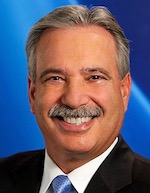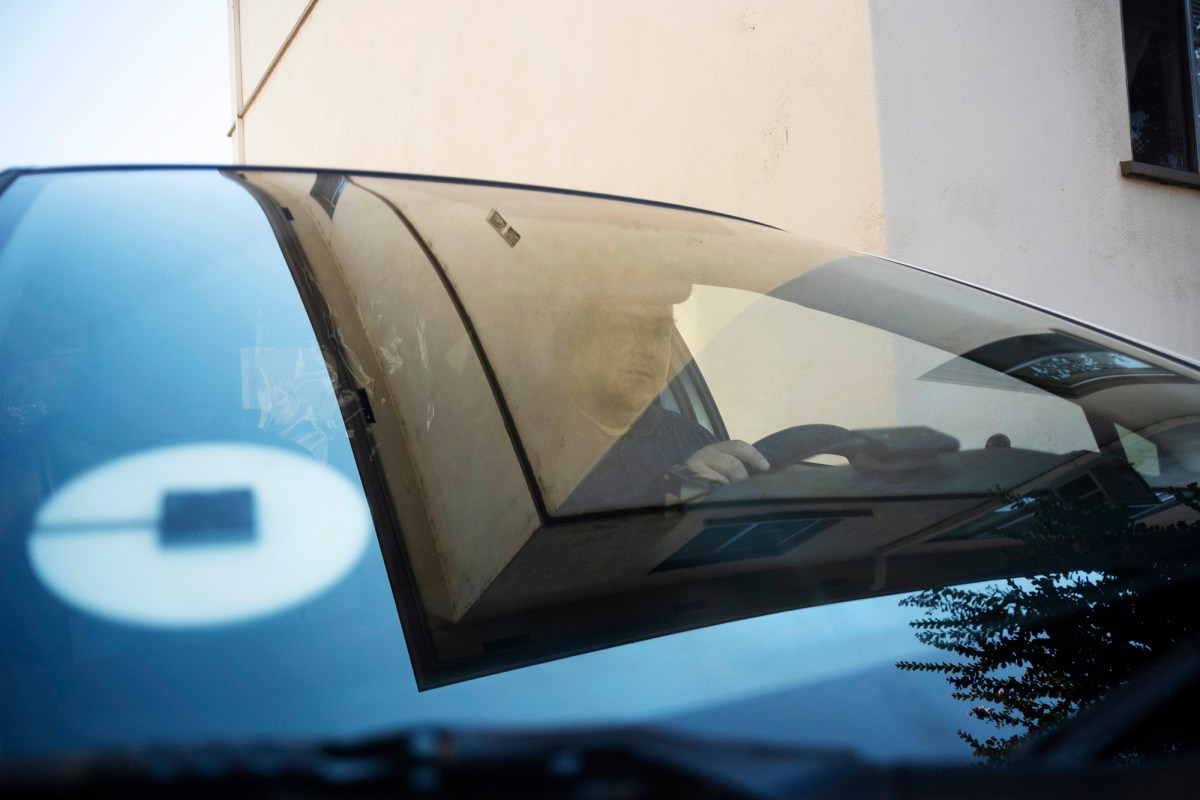Daily Business Report-Oct. 7, 2020
Ben Valdez, a Uber and Lyft driver. (Photo by Tash Kimmell for Cal Matters)
What to know about gig worker pay
before voting on Proposition 22
By Lauren Hepler | CalMatters
How much will your Uber driver get paid if gig companies convince California voters to approve ballot measure Proposition 22? It could be anywhere from $5.64 to $27.58 per hour, depending who you ask.
As early voting begins this week, the most expensive state ballot measure in modern history has widened the fault lines in the battle over the future of work. Some app drivers among the many Californians scrambling for income during the pandemic say they’ll vote yes to keep making money quickly, despite lingering questions about how much they may earn. Others who have spent years dialing in the best-paying routes say they’ll vote no on Prop. 22, and that what they really need is a stable paycheck.
“It’s kind of like going to Vegas,” said Ben Valdez, a five-year Lyft and Uber driver in L.A. who opposes Prop. 22. “Sometimes you do really well, and sometimes you do horrible.” For Valdez, who drives 20-25 hours a week after his day job at a community college, horrible has meant $3 an hour. Hitting it big can be $400 in a 12-hour day, though that, too, can be eaten up quickly by costly car repairs.
With Prop. 22, which is backed by nearly $185 million from Uber, Lyft, DoorDash, Instacart and Uber-owner Postmates, gig companies aim to exempt themselves from the state’s new AB 5 contract labor law. It requires drivers to be classified as employees who earn hourly minimum wage, overtime, mileage reimbursement and benefits like health care and paid leave. With so much money for gig companies at stake, Prop. 22 — which has gained a narrow lead in recent voter polls — has become a bitter business-versus-labor battle with big implications for other states weighing similar regulations.
________________________________________________

C.W. Driver Companies ‘topped out’
on $34 million Downtown building
C.W. Driver Companies“topped out” on a $34 million, 90,000-square-foot office building for LeBeau Realty in the heart of Downtown San Diego. The milestone was marked by the installation of the final steel structural beam on Oct. 1, which was signed by Todd Rider, senior project manager; Mike McConkey, senior superintendent; Daniel Tillett, assistant project manager; Gilbert Agundez, assistant superintendent; Andy Feth, project executive and Richard Freeark, COO with C.W. Driver Companies.
Located at 450 B St., the project includes a six-story, multi-tenant creative office building and a below-grade parking structure. C.W. Driver Companies led the demolition of an existing three-story branch bank structure, along with a portion of the existing plaza level deck.
Extensive structural reinforcing and Fiber Reinforced Polymers (FRP) seismic upgrades are also being made to the existing parking structure to support the new office building. The parking garage will be connected to the facility with three, new nonstop elevators and a central staircase.
The creative office will feature a state-of-the art design by global design and architecture firm Gensler and is aimed to achieve LEED silver certification. The commercial office project is on track for spring 2021 completion.
________________________________________________

USS Pinckney returns home after 9-month deployment
Guided-missiledestroyer USS Pinckney returned to its homeport, Naval Station San Diego, on Monday, following a nine-month deployment to U.S. 7th Fleet and U.S. 4th Fleet areas of operations.
Pinckney, along with a detachment from Helicopter Maritime Strike Squadron (HSM) 75, deployed in January withthe Theodore Roosevelt Carrier Strike Group to the U.S. 7th Fleet area of operations. Pinckney arrived in the U.S. 4th Fleet area of operations in April to participate in U.S. Southern Command and Joint Interagency Task Force South’s enhanced counternarcotics operations in the Caribbean Sea and Eastern Pacific Ocean.
During their deployment, Pinckney, with their embarked U.S. Coast Guard Law Enforcement Detachment (LEDET), recovered an estimated 9,800 kilograms of suspected cocaine and an estimated 2,800 pounds of marijuana worth over an estimated wholesale value of $720 million. In addition, Pinckney also conducted freedom of navigation operations and participated in a passing exercise (PASSEX) with the Guatemalan navy.
“A lengthy deployment is always challenging, even more so in the midst of a global pandemic that kept us all on the ship for the past six months,” said Cmdr. Ryan Conole, Pinckney’s executive officer. “Our team was able stay focused and on mission, and we could not have done that without the support of our families and friends back home who were also dealing with an incredibly challenging environment on the homefront.”
________________________________________________
City to host virtual community forums
for Climate Action Plan update
In order to gather public feedback on climate action efforts and future goals, the City of San Diego is hosting a series of virtual community forums for residents in all nine City Council districts. The virtual forums are scheduled in place of in-person community events due to health orders discouraging public gatherings during the COVID-19 pandemic.
Earlier this year, the Sustainability Department launched Our Climate, Our Future, an expanded vision for climate action in San Diego. When the City’s landmark Climate Action Plan was adopted in 2015, it included a commitment to update the plan in 2020. This update will incorporate changes in state laws and policies, advances in technology, and new goals for creating a more sustainable future for all.
Upcoming dates and registration information for the virtual forms are available on the
city’s website.
All of the forums will be held on Zoom and a link will be sent to participants after they register. Language interpretation services will be available.
Anyone who is unable to attend a virtual forum can share their viewpoints through a public survey available online at SDClimateSurvey.org.
To better understand how the COVID-19 pandemic could impact responses, the survey includes space for respondents to share their own experiences as they relate to our current situation.
________________________________________________
San Diegans can drop off mail
ballots at city libraries
San Diego voters looking for a convenient and quick way to turn in their mail ballot can drop it off at any of the 36 San Diego Public Library locations. Any registered voter in San Diego County is welcome to drop off their mail ballot.
Signed, sealed and dated mail ballot envelopes can be dropped off at City library locations during drop-off hours.
- Through Nov. 2, Monday through Friday from 10:30 a.m.-5:30 p.m.
- On Election Day, Nov. 3, from 7 a.m.-8 p.m.
An official mail ballot drop box, staffed by workers from the San Diego County Registrar of Voters, will be in front of every library location during drop-off hours. The library sites are for mail ballot drop-offs only and are not early voting locations.
Information on mail ballot drop-off services and a list of library locations can be found on the San Diego Public Library’s website. Election and voting information is available from the San Diego County Registrar of Voters at sdvote.com or by calling 858-565-5800.
________________________________________________
Governor makes first appointment
to California Supreme Court
CalMatters

Gov. Gavin Newsom made his first appointment to the California Supreme Court on Monday, nominating retired Justice Martin Jenkins to fill the seat vacated in August by the court’s most conservative member, Justice Ming Chin.
If confirmed, Jenkins, 66, would be the first openly gay justice and the third Black man to serve on California’s highest court. He would also be a moderate voice. Jenkins is perceived as generally less liberal than the four justices appointed by former Gov. Jerry Brown, who in 2019 secured the court’s first Democratic-appointed majority in more than three decades.
Newsom said he is planning on an “expedited” confirmation process that could result in Jenkins sitting on the bench “as early as next month.” California Supreme Court justices are confirmed by the Commission on Judicial Appointments and then by voters at the next general election, as well as at the end of their 12-year terms.
The seven-member court would have two Republican nominees and five Democratic nominees if Jenkins is confirmed.
________________________________________________
Michael J. Fox Foundation, Acadia
Pharmaceuticals in partnership
The Michael J. Fox Foundation for Parkinson’s Research (MJFF) and San Diego-based Acadia Pharmaceuticals announce a partnership to provide free educational materials to patients and their care partners. The resources will focus on cognitive changes and other non-motor symptoms in Parkinson’s, something that not every individual with the disease will experience, but that many worry about.
Stigma and misperceptions about Parkinson’s disease (PD) and its symptoms can hinder much-needed research into understanding the disease and how to treat and, ultimately, prevent it. The MJFF-Acadia partnership will foster a dialogue around thinking and memory changes and associated neuropsychiatric symptoms in PD in order to connect patients and families to practical and accessible resources, according to the partnership.
________________________________________________
Petco ends the sale of
electronic ‘shock’collars
Petco announced it has stopped selling specific electronic “shock” collars, both in-store and online. “Electricity may be critical to powering your microwave, but it has no role for the average pet parent training their dog,” said Petco CEO Ron Coughlin. “Shock collars have been shown to increase fear, anxiety and stress in dogs, and we believe there’s a better way – Positive Reinforcement Training. As a health and wellness company, our mission is focused on improving pet lives and we think selling shock collars does the opposite. It’s our responsibility to ensure that we, and others, aren’t putting potentially harmful products in the wrong hands.”
The decision, which was confirmed in consultation with the Petco Pet Wellness Council, includes all human- and bark-activated electronic pet collars, commonly referred to as “shock” collars, which have been removed from Petco’s in-store and online assortment. Pet parents will be encouraged to try products and services rooted in positive reinforcement training methods backed by experts, including a newly launched online training program, as well a suite of private and in-home training classes, all led by more than 1,200 Petco Certified Dog Trainers.
________________________________________________
KPBS General Manager Tom Karlo to retire

KPBS General Manager Tom Karlo will retire after a 47-year career at the public media station. Karlo, who began working at KPBS in 1973 as a cameraman when he began as a student while attending SDSU, is slated to retire at the end of the calendar year.
Over the nearly five decades with KPBS, Karlo worked his way up through the organization, including work in television production, operations, program distribution and finance before being named general manager in 2009. With his appointment, Karlo became only the fifth general manager in KPBS’ 60 year history.
Over the span of his KPBS career, Karlo led the news agency into a new era of multiplatform content. Since 2009, KPBS added a weekday television newscast and digital news on KPBS.org. The agency also added social media to an existing and well established radio news team and, today, has content on more than 30 platforms.
In Karlo’s nearly 12 years asgeneral manager, KPBS has grown to 180 full and part-time staff; the news team started at 15 people and is now close to 50. The audience has grown to more than 1.3 million each week; and operating revenue has nearly doubled from when he took over as general manager.
________________________________________________
USD approves ‘test blind’ admissions for 2021
The University of San Diego (USD) has decided to become a “test blind” campus and pledges not to view an incoming student’s standardized tests during the admissions process. At the end of May, USD adopted an optional-testing admissions process. The announcement to become a “test blind” campus furthers the university’s commitment to increase academic access and social equity, as well as provide an admissions process that is fair and equitable for all students.
USD made the optional-testing admissions decision in the spring, not based on the pandemic or its impact on testing, but rather based on USD’s goals to create a diverse and inclusive community of students by offering equitable access to standardized testing for all students. Since then, hundreds of colleges and universities have also decided to be test-optional for this admission cycle, largely because of the challenges the pandemic has caused in the availability of testing.
According to FairTest, USD joins nearly 60 other institutions that have also adopted a “test blind” policy. The new “test blind” admission procedure will begin with the entering class of 2021.
________________________________________________
Engineers develop ‘squidbot’
for underwater exploration
Engineers at the University of California San Diego have built a squid-like robot that can swim untethered, propelling itself by generating jets of water. The robot carries its own power source inside its body. It can also carry a sensor, such as a camera, for underwater exploration.
The researchers detail their work in a recent issue of Bioinspiration and Biomimetics.
“Essentially, we recreated all the key features that squids use for high-speed swimming,” said Michael T. Tolley, one of the paper’s senior authors and a professor in the Department of Mechanical and Aerospace Engineering at UC San Diego. “This is the first untethered robot that can generate jet pulses for rapid locomotion like the squid and can achieve these jet pulses by changing its body shape, which improves swimming efficiency.”
This squid robot is made mostly from soft materials such as acrylic polymer, with a few rigid, 3D printed and laser cut parts. Using soft robots in underwater exploration is important to protect fish and coral, which could be damaged by rigid robots. But soft robots tend to move slowly and have difficulty maneuvering.
The research team, which includes roboticists and experts in computer simulations as well as experimental fluid dynamics, turned to cephalopods as a good model to solve some of these issues. Squid, for example, can reach the fastest speeds of any aquatic invertebrates thanks to a jet propulsion mechanism.
Their robot takes a volume of water into its body while storing elastic energy in its skin and flexible ribs. It then releases this energy by compressing its body and generates a jet of water to propel itself.


